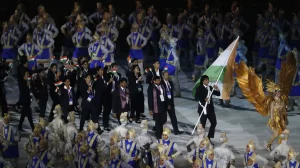India must tap multilateral forums such as BRICS and the SCO to further its ambitions to become a sporting powerhouse
JAYANTH JACOB
AUGUST 19, 2022 / 09:44 AM IST

Sporting glories are often symbols of world power status. It is a misconception that dominance either in the sporting field or in the culture sphere is a marker of soft power.
Barring a few instances such as Ethiopian long-distance runners or Jamaican sprinters or Latin American and Eastern European football teams cementing their unique positions consistently, dominance in the sporting arena is inalienably linked to the economic and geopolitical significance of a country.
Hosting a global sporting event has always been a measure of a country’s international influence. As India basks in yet another remarkable show at the recently-concluded Commonwealth Games, it’s time to think about ways through which the country can step up its efforts to become a global sporting power.
One of the most-talked about, yet to be fully realised areas is the platforms of BRICS (Brazil, Russia, India, China, and South Africa) and the Shanghai Cooperation Organisation (SCO) that together account for a population of four billion people.
Addressing his first BRICS summit in the Brazilian town of Fortaleza in July 2014, Prime Minister Narendra Modi underscored ‘collaboration and competitions’ in sports as one of the key objectives to foster ties among the grouping.
Barring India, the other BRICS countries have hosted an Olympics or a Football World Cup. Russia, and Brazil have hosted both.
Then Brazilian President Luiz Inácio Lula da Silva said in 2009, after it was certain that his country would host an Olympics, the first in the history of South America: “Today is the day that Brazil gained its international citizenship … Brazil has left behind the level of second-class countries and entered the rank of first-class countries.” Nothing could be further than a geopolitical reality as far as sporting power is concerned.
Sporting excellence and hosting mega events are important indicators of the standing of a country, and a region. The United States has hosted eight Olympic Games — that’s more than any other country, followed by France with five, and Japan with four editions of the biggest global sporting event.
The United Kingdom, Canada, Italy, and Germany have each hosted three editions of the games. If you look at these numbers differently, Europe hosted the Olympics 30 times, Asia eight times. Africa, Central Asia, and the Indian subcontinent are yet to host an Olympics.
Developing sporting infrastructure and nurturing athletes are no easy task. In a country like India there is no dearth of great talent. Take the example of Avinash Sable, the silver medallist in steeplechase in the just-concluded Commonwealth Games. In the last six editions of the game, all the three medals in that category were won by athletes from Kenya. Sable is no ordinary athlete, because about six years ago, he was not an athlete.
No sporting culture thrives in isolation, and everyone knows the importance of foreign coaches, and training facilities abroad that can make a huge difference to the fortunes of athletes. In this context, greater co-operation in sports among BRICS and SCO countries can be of a win-win situation for all. There are hardly any other emotional binders like sports that drive passion, bonding, and building people-to-people interaction that lies at the heart of any groupings that aspire to challenge the existing world order to claim their own rightful place.
With programmes like the Target Olympic Podium Scheme (TOPS), the Government of India is investing and focusing on sports like never before. However, the potential for sports must be further explored in multilateral forums such as BRICS and the SCO. Sports as a foreign policy tool, and as a diplomatic initiative is not a new concept, and now is a good time for New Delhi to incorporate it into its MEA lexicon.
Money Control


I want to to thank you for this good read!! I certainly loved every little bit of it. I have you bookmarked to look at new things you postÖ